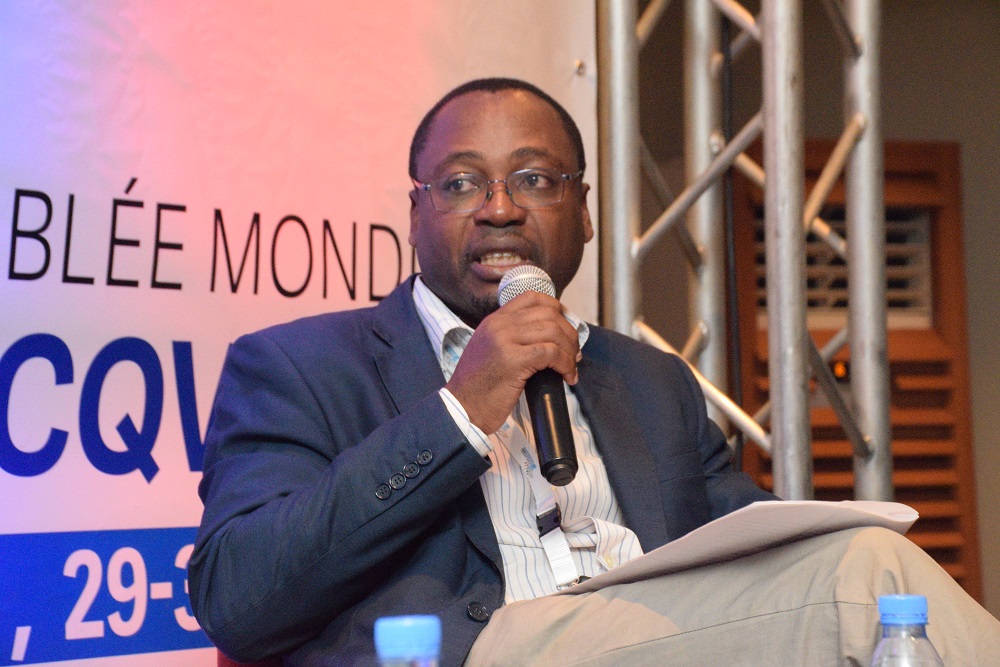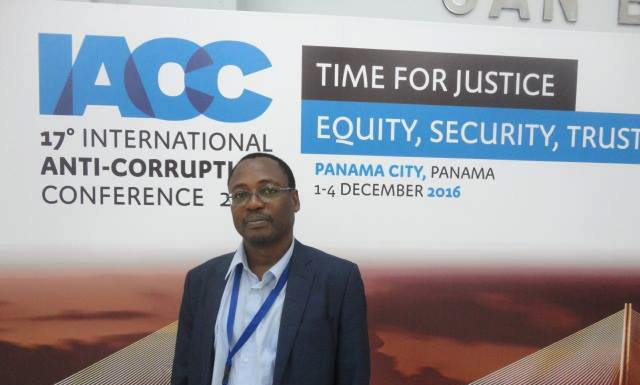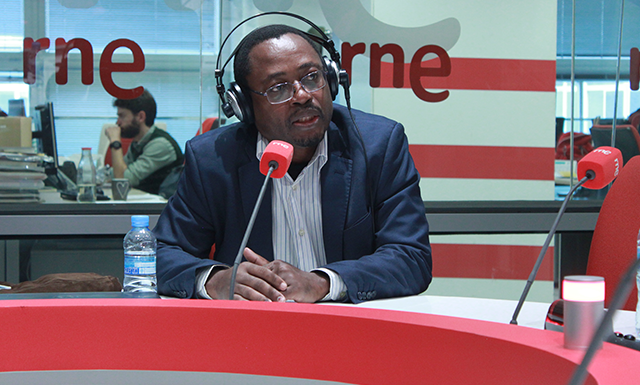Prominent human rights defender under serious threats to his life in Equatorial Guinea
Blogs and News

French version here, Spanish here
A group of human rights and anti-corruption civil society organisations* is appalled by the illegal detention and house arrest of human rights defender Alfredo Okenve Ndoho on the same day that he was supposed to receive the Franco-German Human Rights Award at a ceremony organised by the French Embassy in Malabo last Friday. Sources and previous incidents indicate he is facing serious threats to his life.
Alfredo is a prominent human rights defender who has relentlessly been denouncing corrupt practices and human rights violations in Equatorial Guinea, particularly highlighting transparency issues related to the extractive industries. He is Vice President of the NGO Centro de Estudios e iniciativas para el Desarrollo (CEID).
Alfredo came back to his native Equatorial Guinea on 16 February 2019, after receiving intensive health care in Spain following a previous brutal assault by security forces on 27 October 2018.
On 15 March, the day Alfredo was due to receive the human rights award, his cousin, a leader of the political party Unión Popular (UP) Joaquín Mangué Obama, was arrested by security forces at his home in Malabo for refusing to disclose information regarding the whereabouts of Alfredo.
That same night, as he sought to urgently leave the country for fear for his life, Alfredo was detained at the Malabo airport passport control office. Eight security officers secretly flew him handcuffed to Bata aboard a military plane. Once in Bata, he was driven to an undisclosed location until his drivers decided to go back to the city to bring him to his house in Bata, where he has been under house arrest since. He received the instruction of not leaving his house under any circumstances. His passport and mobile phone were seized by the police.
“We are deeply worried about Alfredo’s situation and the serious threats he is facing to his life” said Elisa Peter, Executive Director of Publish What You Pay. “We are concerned these attacks are not isolated incidents – several prominent human rights defenders and political activists in Equatorial Guinea have been the targets of attacks in the past few months, despite repeated calls by the international community to refrain from systematically cracking down on dissident voices.”
Civil society organisations are particularly worried that these attacks will intensify at the prospect of the upcoming Universal Periodic Review (UPR) which Equatorial Guinea will undergo in May in Geneva – in an attempt to quell dissenting voice.
We call on:
The Government of Equatorial Guinea to immediately release Alfredo and cease all acts of intimidation against him, his colleagues and family members, as well as against all activists in the country. We additionally request Equatorial Guinea to abide by its international human rights obligations, and in particular by articles 19, 21 and 22 of the International Covenant on Civil and Political Rights (ICCPR) which guarantee the right to freedom of expression, the right to freedom of peaceful assembly and the right to freedom of association, respectively.
The Extractive Industries Transparency Initiative (EITI) Board – amid reopening of negotiations to join the initiative – to send a clear message to Equatorial Guinea that repression against civil society activists violates the EITI Standard, will not be tolerated and will significantly jeopardise the prospects of approval of the country’s candidature application.
The United Nations, in particular the Human Rights Council through the upcoming UPR, to urgently address and shed light on the systematically orchestrated clampdown on independent political dissents.
Oil companies operating in Equatorial Guinea, notably ExxonMobil, Kosmos Energy, Marathon, Noble Energy, Clontarf, Ophir Energy – especially those represented on the EITI Board and other EITI supporting companies, to immediately denounce this attack as unfit for a country wishing to join the initiative.
The International Monetary Fund (IMF) to exhort the Government to fulfill the sign-up requirements of the EITI Standard, including on the need to provide an enabling environment for civil society participation, notably in the natural resource sector.
Signed by
CEE Bankwatch Network
DAWN (Development Alternatives with Women for a New Era)
EG Justice
Front Line Defenders
Global Witness
Green Advocates
International Accountability Project
International Budget Partnership
NRGI
Observatory for the Protection of Human Rights Defenders – International Federation for Human Rights (FIDH)- World Organisation Against Torture (OMCT)
Oxfam International
Oxfam America
Publish What You Pay
Tournons La Page
Transparency International
Transparency International France
UNCAC Coalition
WoMin African Alliance
—-
Background Information
Equatorial Guinea, an oil-rich country in West Africa, is pervaded with rampant corruption and systematic human rights violations. The majority of dissidents face harassment, intimidations, threats, arbitrary detentions, as well as physical attacks and killings. Most of them have to leave the country to be able to conduct their human rights activities and self-censorship is the rule for most activists and journalists, still operating in the country.
Equatorial Guinea has twice attempted to join the EITI – a leading multi-stakeholder initiative for transparency and good governance in the extractives sector. These applications, in 2010 and 2014, were both rejected due to unjustified crackdowns on civil society activists, including Alfredo Okenve, whose organisation was suspended in 2016 and who suffered arbitrary detentions in 2017. The country has recently made its intention to rejoin the initiative public, and has received comprehensive briefings from the EITI Secretariat on the requirements for candidacy included in the EITI Standard. In contrast to the government’s press release, it should be noted that it does not have the official backing of EITI on its candidacy, as this is not a part of the sign-up process.
Equatorial Guinea will be examined during the May session at the UPR of the Human Rights Council. It is currently a member of the United Security Council.











